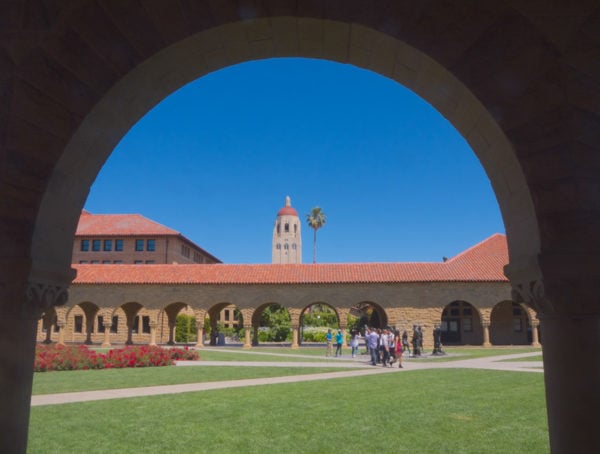Stanford administrators criticized the Stanford College Republicans (SCR)’s upcoming event “Yes, America is a Judeo-Christian Nation” — featuring conservative author Andrew Klavan — in a Monday night Notes from The Quad blog post, citing concern over Klavan’s fostering of anti-Muslim sentiments, as well as SCR’s “publicity tactics that have targeted Muslim students.”
Vice Provost for Student Affairs Susie Brubaker-Cole and Dean for Religious Life Tiffany Steinwert authored the post, in which they urged students to “look beyond the sensationalism of speakers whose currency is controversy.”
Klavan is slated to speak on Tuesday night, just days after anti-Zionist cartoonist Eli Valley called SCR “shitheads” and accused conservatives of fostering white supremacist, anti-Jewish hate in an event sponsored by the Stanford Students for Justice in Palestine (SJP) and Stanford Jewish Voice for Peace (JVP). Flyers and counterflyers — the latter of which contained cartoons from the Nazi-era German newspaper Der Stürmer — sparked a conversation between student groups at the Hillel Jewish Community Center, after which the flyers were voluntarily removed.
Brubaker-Cole and Steinwert conveyed particular concern with views Klavan has expressed in relation to Islam, referencing a video in which he “distorts the tenets of Muslim faith, equating Islam with violence and barbarism” while simultaneously promoting Christianity.
“We stand firmly against vilification of Islam,” Brubaker-Cole and Steinwert wrote. “We are particularly dismayed that an event of this type is planned for the holy month of Ramadan when the Stanford Muslim community joins Muslims around the world in observing a month of fasting, prayer and spiritual growth.”
SCR responded to Brubaker-Cole and Steinwert in an email to The Daily, writing that it “invited Andrew Klavan because SCR believes that providing students with an opportunity to explore the importance of our Judeo-Christian heritage is of paramount importance.”
“America is a nation built on Judeo-Christian principles,” SCR wrote, “and that will always be the truth regardless of the time of year.”
“We also see nothing wrong with Klavan’s views on radical Islam and jihadist terrorism,” SCR added. “There is ample evidence that aspects of Islamic doctrine provide a scriptural basis for radical Islamic terrorists who commit horrific acts of violence against innocents across the world.”
In her own email to The Daily, co-president Emily Wilder ’20 wrote on behalf of JVP to oppose the very concept of “Judeo-Christian values,” writing that the claim that American was founded on these values not only erases Jewish history but is disseminated with a purpose of maligning and excluding Muslims.
“This is not the first time the Stanford College Republicans have brought an Islamophobic speaker to campus with the purpose of lauding Judeo-Christian civilization, an intellectually defunct dog whistle with extremely dangerous implications,” Wilder wrote. “The organization’s choices of speakers show that their politics are contradictory and self-serving, as well as scholarly and ethically unviable.”
“We find it unfortunate that SCR, instead of choosing anything principled or meaningful to do with their time, have spent their resources propping up hateful and libelous speakers while, ironically, criticizing the conduct of groups like SJP and JVP,” Wilder added.
Courtney Cooperman ’20, co-president of Jewish Student Association (JSA), wrote on behalf of JSA, voicing the same concerns as JVP with regard to the mischaracterization of the Muslim community when ideas such as “Judeo-Christian heritage” are invoked.
“The Jewish Student Association Board recognizes the harmful impact of this specific rhetoric, stands in solidarity with Stanford’s Muslim community, and affirms the importance of diverse faith traditions in the fabric of American identity,” Cooperman wrote. “Religious pluralism enriches our campus and our country, and we reject all efforts to demean or alienate our friends in the Muslim community, as well as any other religious or cultural group.”
Brubaker-Cole and Steinwert also voiced their concern with the publicity tactics used in the weeks leading up to the event, which they write have specifically targeted Muslim students. Such actions include stapling and spreading flyers across the Markaz, the Muslim community center, which the pair write reflect a “deliberate attempt to disturb and disrespect our Muslim community.”
Markaz representatives did not immediately respond to request for comment.
SCR disagreed with this portrayal of their advertisement methods, writing that members placed flyers throughout the Nitery and did not specifically target the Markaz.
“The Markaz center occupies just one section of one floor of the building, so to suggest that putting one flyer in the Markaz center as well as every other part of the building constitutes deliberate ‘targeting’ is a harsh mischaracterization,” SCR wrote.
Brubaker-Cole and Steinwert emphasized the University’s commitment to free expression, but qualified their statement by highlighting the aim as a campus to model “responsible” use of such expression. The pair alluded to recent controversy about free speech on campus, identifying a standard of “ethical, moral, and/or responsible” speech that transcends the broader expression that is legally protected.
“While we cannot legislate it, we hope the members of our community will aspire to a higher set of standards than the bare minimum letter of the law, promoting speech that edifies and uplifts our diverse community,” they wrote.
“The administrative response seems particularly over-the-top considering the mild student response to this event. We hope that Stanford administrators exercise more restraint (or at the very least contact us first) before they issue a statement regarding one of our events,” SCR wrote.
Brubaker-Cole and Steinwert ended their post on a reflective note, encouraging students to focus on examples of people joining in solidarity, across perceived differences, in the face of hatred and slander. They encouraged students to have hope in the communities already present and to stand with each other to make “ a community of care and shared dignity a reality.”
“Together we can be and do better,” they wrote.
Contact Emma Smith at esmith11 ‘at’ stanford.edu.
